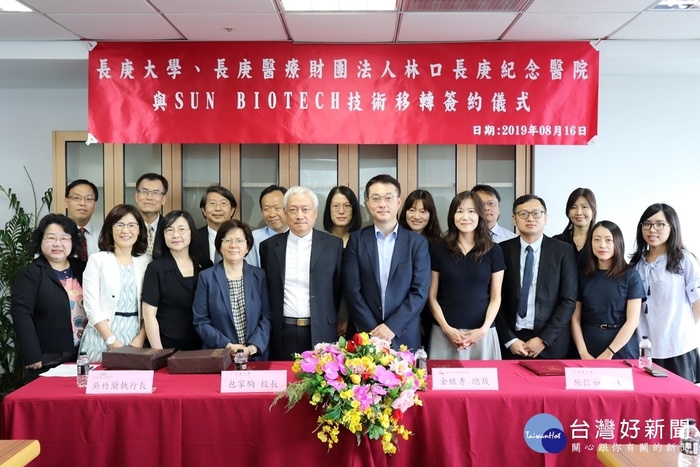【CGU】Chang Gung University and Singaporean vaccine company Sun Biotech have signed a technology transfer contract

Chang Gung University and Singaporean vaccine company Sun Biotech have signed a technology transfer contract to cooperatively develop a new anti-enterovirus vaccine
Release date: 08/16/2019
The research and development team co-led by Shin-Ru Shih, director and distinguished professor of the Research Center for Emerging Viral Infections of Chang Gung University, and Kuo-Chien Tsao, Deputy Director, Department of Medical Laboratory, Chang Gung Memorial Hospital. On August 16th, Chang Gung University officially signed a technology transfer contract for an enterovirus viral gene expression plasmid with Sun Biotech.
The signing ceremony was held in the management building of Chang Gung University, and the contract was signed by Chia-Chu Pao, the president of the university; Tsu-Lan Wu, the Executive Director of Chang Gung Memorial Hospital; Shin-Ru Shih, the research and development team representative; and Hyun Soo Kim, president and CEO of Sun Biotech. Director Shih briefed the participants on the results of the technology transfer and hopes that the vaccine will be developed as soon as possible to prevent hand, foot, and mouth disease.
Director Shih stated that hand, foot, and mouth disease is mainly caused by different types of Enterovirus, which may cause symptoms such as herpangina and severe Enterovirus. To date, no drugs or vaccines have been developed that can simultaneously fight different types of Enterovirus; developing such a vaccine may reduce the risk of severe Enterovirus and hand, foot, and mouth disease in infants and children.
Using clinically isolated virus strains, the Chang Gung research team applied molecular virology to identify virus strains with potential to serve as vaccines and established vectors capable of expressing Enterovirus genes. Chang Gung University transferred this enterovirus viral gene expression plasmid technology to Sun Biotech for use in developing an anti–hand, foot, and mouth disease virus–like particle vaccine that can combat hand, foot, and mouth disease and severe enterovirus-related illnesses. In 1998, enterovirus 71 was first discovered in Taiwan. A pandemic occurs every few years, causing concern among parents. A considerable number of severe cases have been reported this year in Southeast Asian countries, such as Cambodia and Vietnam. These cases have gradually attracted international attention, and identifying improved prevention and treatment methods is imperative.
Director Shih mentioned that in addition to enterovirus 71, other types of Enterovirus can cause herpangina and difficulty swallowing, leading to physical and mental exhaustion among both parents and infants. The development of an anti–hand, foot, and mouth disease virus–like particle vaccine would be able to protect infants and young children from such viral infections. The virus-like particle enterovirus vaccine is different from conventional inactivated vaccines. In the future, Sun Biotech will use the enterovirus viral gene expression plasmid to assemble a virus-like particle in the cell by using recombinant DNA technology, through which its complete viral envelope structure can induce specific neutralizing antibodies. However, the virus-like particles do not contain viral genomes, meaning that they will not be infected by Enterovirus and are therefore safe to use. The protection effectiveness of the vaccine will be tested by the Research Center for Emerging Viral Infections in the future. With the collaborative effort of both parties, infants and young children can be provided with a new generation of enterovirus vaccines to safeguard their health.
Chang Gung University stated that the results of this technology transfer are supported by the Featured Areas Research Center Program within the framework of the Higher Education Sprout Project by the Ministry of Science and Technology (MOST) and the Ministry of Education (MOE), Taiwan. Relevant technology with relatively high commercial value was also selected by MOST to receive the 2018 Futuretech Breakthrough Award at the Future Tech Expo. The Research Center for Emerging Viral Infections research team also emphasized that they will continue to collaborate with international teams to develop vaccines and drugs related to emerging viruses and assist domestic and foreign manufacturers in providing relevant services for epidemic-prevention products.

